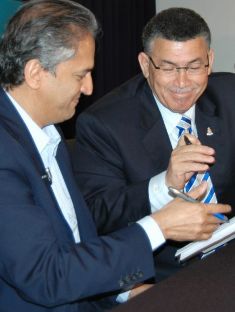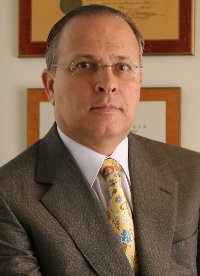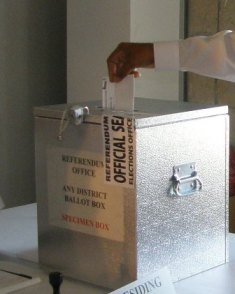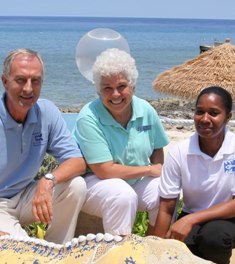Archive for April, 2010

Surgeons complete first full face transplant
(BBC): A team of 30 Spanish doctors say they have successfully performed the world’s first full face transplant. A man injured in a shooting accident received the entire facial skin and muscles – including cheekbones, nose, lips and teeth – of a donor.The man is recovering well after the 22-hour operation, said a spokesperson from Vall d’Hebron University Hospital. Another 10 face transplants have been carried out around the world, but this is believed to be the most complex. Hospital spokesperson Bianca Bont told the BBC: "This is the first total face transplant. "There have been 10 operations of this kind in the world – this is the first to transplant all of the face and some bones of the face."

Putting things in perspective for Cayman
Groucho Marx famously said, “The secret of life is honesty and fair dealing. If you can fake that, you’ve got it made.” He also asked a rhetorical question, “Is this a game of chance?” To which he answered, “Not the way I play it.” Had Groucho been alive to read the recent SEC Complaint against Goldman Sachs and Mr Tourre, he would doubtless have smiled and lit a cigar.

Cautious support for Shetty
 (CNS): The opposition has said that in principle it supports the general goal to develop medical tourism in the Cayman Islands and to encourage Dr Devi Shetty to take the first step with his proposed project. However, the PPM says it believes there must be careful and considerable long term planning for the initiative as it will have a significant impact on the country’s infrastructure in many ways. Speaking to CNS last week, Alden McLaughlin said he and his opposition colleagues wanted to see the project go ahead but there had to be discussions in the community about how it would cope with the changes the hospital would bring.
(CNS): The opposition has said that in principle it supports the general goal to develop medical tourism in the Cayman Islands and to encourage Dr Devi Shetty to take the first step with his proposed project. However, the PPM says it believes there must be careful and considerable long term planning for the initiative as it will have a significant impact on the country’s infrastructure in many ways. Speaking to CNS last week, Alden McLaughlin said he and his opposition colleagues wanted to see the project go ahead but there had to be discussions in the community about how it would cope with the changes the hospital would bring.
Wine shop licence refused
(CNS): Following the meeting of the Liquor Licensing Board on Thursday, plans by wine merchant Jacques Scott to open a new flagship store in West Bay have been derailed since the board did not grant a license. Peter Dutton had made an application for a change of location for an existing licence at Jacques Scotts’ small store at the harbour front in George Town to a proposed new location by Foster’s Republix. Dutton and his lawyer presented the plans for the new West Bay store to the board on Thursday afternoon. However, a number of objections were raised from local residents and existing liquor stores in the district and the board refused the application.

Board refuses wine shop license
(CNS): Following the meeting of the Liquor Licensing Board on Thursday plans by wine merchant Jacques Scott to open a new store flagship store in West Bay have been derailed after the board did not grant a license. Peter Dutton had made an application for a change of location for an existing licence at Jacques Scotts’ small store at the harbour front in George Town to a proposed new location by Foster’s Republix. Dutton and his lawyer presented the plans for the new West Bay store to the board on Thursday afternoon. However, a number of objections were raised from local residents and existing liquor stores in the district and the board refused the application.

Tax haven fight continues one year on
 (MSN): A year after leaders at a summit of the G20 nations declared an end to the era of bank secrecy, most of the countries targeted as tax havens have, one by one, been taken off the list of offenders. But for many critics, the banking world is still a long way from financial transparency. While French President Nicolas Sarkozy said "There are no tax havens any more," some disagree. Rather than the OECD list, they prefer one compiled by the Tax Justice Network which still has 60 different territories operating as tax havens, including many of those given a clean bill of health by the international community including London and Delaware.
(MSN): A year after leaders at a summit of the G20 nations declared an end to the era of bank secrecy, most of the countries targeted as tax havens have, one by one, been taken off the list of offenders. But for many critics, the banking world is still a long way from financial transparency. While French President Nicolas Sarkozy said "There are no tax havens any more," some disagree. Rather than the OECD list, they prefer one compiled by the Tax Justice Network which still has 60 different territories operating as tax havens, including many of those given a clean bill of health by the international community including London and Delaware.

New US legislation under scrutiny at local summit
 (CNS): The “Hiring Incentives to Restore Employment” Act of 2010 (HIRE Act) described as the latest effort by the US Government to restrict the use of offshore structures will be under the spotlight at the Cayman Finance Summit next month. Steven Cantor, managing partner at Cantor & Webb Attorneys at Law will be providing insight into this piece of US legislation and the affect it may have on the Cayman Islands the organisers said. Contained within the HIRE Act are a series of tax provisions designed to combat noncompliance of tax laws and end several perceived abuses related to foreign accounts and entities owned by United States residents.
(CNS): The “Hiring Incentives to Restore Employment” Act of 2010 (HIRE Act) described as the latest effort by the US Government to restrict the use of offshore structures will be under the spotlight at the Cayman Finance Summit next month. Steven Cantor, managing partner at Cantor & Webb Attorneys at Law will be providing insight into this piece of US legislation and the affect it may have on the Cayman Islands the organisers said. Contained within the HIRE Act are a series of tax provisions designed to combat noncompliance of tax laws and end several perceived abuses related to foreign accounts and entities owned by United States residents.

Voters to weigh-in on future constituencies
 (CNS): Public meetings regarding the changes to the country’s political landscape begin on Monday evening in George Town. The public is being encouraged to meet with representatives of the new Electoral Boundary Commission (EBC) this week to offer opinions and comments on how three extra representatives should be added to the Legislative Assembly and where and how future constituencies should be shaped. George Town residents will have the opportunity to meet and make submissions to the EBC on 26 April, from 7- 9pm at the Mary Miller Memorial Hall, while West Bay residents can meet on Tuesday, 27 April, at the John A. Cumber School Hall also from 7-9pm.
(CNS): Public meetings regarding the changes to the country’s political landscape begin on Monday evening in George Town. The public is being encouraged to meet with representatives of the new Electoral Boundary Commission (EBC) this week to offer opinions and comments on how three extra representatives should be added to the Legislative Assembly and where and how future constituencies should be shaped. George Town residents will have the opportunity to meet and make submissions to the EBC on 26 April, from 7- 9pm at the Mary Miller Memorial Hall, while West Bay residents can meet on Tuesday, 27 April, at the John A. Cumber School Hall also from 7-9pm.

Dive resorts make others ‘green’ with envy
 (CNS): Two dive resorts in the Cayman Islands have added a very attractive accolade and advantage to their status after receiving Green Globe Certified through their participation in the Cayman Islands Environmental Project for the Tourism Sector (CEPTS). Cobalt Coast and Compass Point have gained the highly regarded certification for the travel and tourism industry, demonstrating their commitment to improving environmental performance and efficient operations.Considered a real badge of honour, the certification is also a very valuable tool to attract new business. (Left: Cobalt Coast Green Team)
(CNS): Two dive resorts in the Cayman Islands have added a very attractive accolade and advantage to their status after receiving Green Globe Certified through their participation in the Cayman Islands Environmental Project for the Tourism Sector (CEPTS). Cobalt Coast and Compass Point have gained the highly regarded certification for the travel and tourism industry, demonstrating their commitment to improving environmental performance and efficient operations.Considered a real badge of honour, the certification is also a very valuable tool to attract new business. (Left: Cobalt Coast Green Team)
Minister encourages vigilance for kids’ vaccinations
(CNS): Delivering his message for vaccination, the health minister has said that while Cayman has the most successful vaccination programme in the Caribbean, as host to over 100 nationalities even when some diseases are eliminated locally the island is vulnerable to reintroduction. He said parents should remain vigilant and check their children’s vaccination cards. 97% of children in Cayman are vaccinated as they enter primary school against a number of childhood diseases and the HSA has recently introduced programmes to protect children from the rotavirus vaccine and the pneumococcal vaccine.